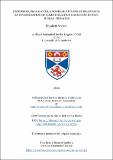Files in this item
Ostension, pragmatics, and presumptions of relevance : an investigation of communication cognition in non-human primates
Item metadata
| dc.contributor.advisor | Call, Josep | |
| dc.contributor.author | Warren, Elizabeth | |
| dc.coverage.spatial | 173 | en_US |
| dc.date.accessioned | 2023-05-10T10:51:59Z | |
| dc.date.available | 2023-05-10T10:51:59Z | |
| dc.date.issued | 2023-06-15 | |
| dc.identifier.uri | https://hdl.handle.net/10023/27558 | |
| dc.description.abstract | A prominent debate in the study of non-human primate cognition concerns their level of cognitive engagement with communication, and especially their capacity for pragmatic and ostensive communication. I investigated this question across four experiments, probing non-human primates’ expectations in response to ostensive behaviour and their production of context-dependent, goal-directed gestures in a cooperative setting. In the first experiment, I examined whether chimpanzees (Pan troglodytes) moderated their object choice patterns based on their differentiation between ostensive and non-ostensive displays from me, a cooperative human partner. In the second experiment, I investigated whether seven species of non-human primates acquired an expectation of relevant information when they were addressed with ostensive communication, using their gaze-following behaviour as a measure. In the third experiment, I explored whether all four species of non-human great apes moderated their expectation of action from me following ostensive address, measured by their production of requesting behaviours. This experiment used varying emotional valences within the ostensive displays, in order to examine whether subjects were sensitive to the context-setting nature of emotional tone in communication. In the fourth experiment, I examined whether chimpanzees produced requesting behaviours pragmatically depending on their past experience with me as cooperative partner. The results from these four experiments showed that certain primates are sensitive to the presumption of relevance generated by ostensive behaviour, and that their responses to ostensive communication are moderated by factors such as emotional valence. These results did not suggest, however, that primates are able to compute specific informational meanings following ostensive communication, nor that they rely on mutual common ground to imbue their own communication with meaning. I interpret these findings in context with existing theories of pragmatic and ostensive communication and analyse some theoretical and empirical factors that make a paradigm suitable for the study of ostensive communication in non-human primates. | en_US |
| dc.description.sponsorship | “This work was supported by the European Research Council (ERC) under the European Union's Horizon 2020 research and innovation programme under grant agreement No. ERC_609819 {SOMICS}.”--Funding | en |
| dc.language.iso | en | en_US |
| dc.relation | Ostension, Pragmatics, and Presumptions of Relevance: An Investigation of Communication Cognition in Non-Human Primates (thesis data) Warren, E., University of St Andrews, 9 May 2023. DOI: https://doi.org/10.17630/028ac848-dc1d-431c-b908-fca799011353 | en |
| dc.relation.uri | https://doi.org/10.17630/028ac848-dc1d-431c-b908-fca799011353 | |
| dc.rights | Creative Commons Attribution-NonCommercial-NoDerivatives 4.0 International | * |
| dc.rights.uri | http://creativecommons.org/licenses/by-nc-nd/4.0/ | * |
| dc.subject | Primate cognition | en_US |
| dc.subject | Animal communication | en_US |
| dc.subject | Communication cognition | en_US |
| dc.subject | Ostensive communication | en_US |
| dc.subject | Pragmatic communication | en_US |
| dc.subject | Social cognition | en_US |
| dc.subject | Inferential communication | en_US |
| dc.subject.lcc | QL737.P9W28 | |
| dc.subject.lcsh | Primates--Psychology | en |
| dc.subject.lcsh | Primates--Behavior | en |
| dc.subject.lcsh | Animal communication | en |
| dc.title | Ostension, pragmatics, and presumptions of relevance : an investigation of communication cognition in non-human primates | en_US |
| dc.type | Thesis | en_US |
| dc.contributor.sponsor | European Research Council (ERC) | en_US |
| dc.type.qualificationlevel | Doctoral | en_US |
| dc.type.qualificationname | PhD Doctor of Philosophy | en_US |
| dc.publisher.institution | The University of St Andrews | en_US |
| dc.identifier.doi | https://doi.org/10.17630/sta/436 | |
| dc.identifier.grantnumber | ERC_609819 {SOMICS} | en_US |
The following licence files are associated with this item:
This item appears in the following Collection(s)
Except where otherwise noted within the work, this item's licence for re-use is described as Creative Commons Attribution-NonCommercial-NoDerivatives 4.0 International
Items in the St Andrews Research Repository are protected by copyright, with all rights reserved, unless otherwise indicated.


